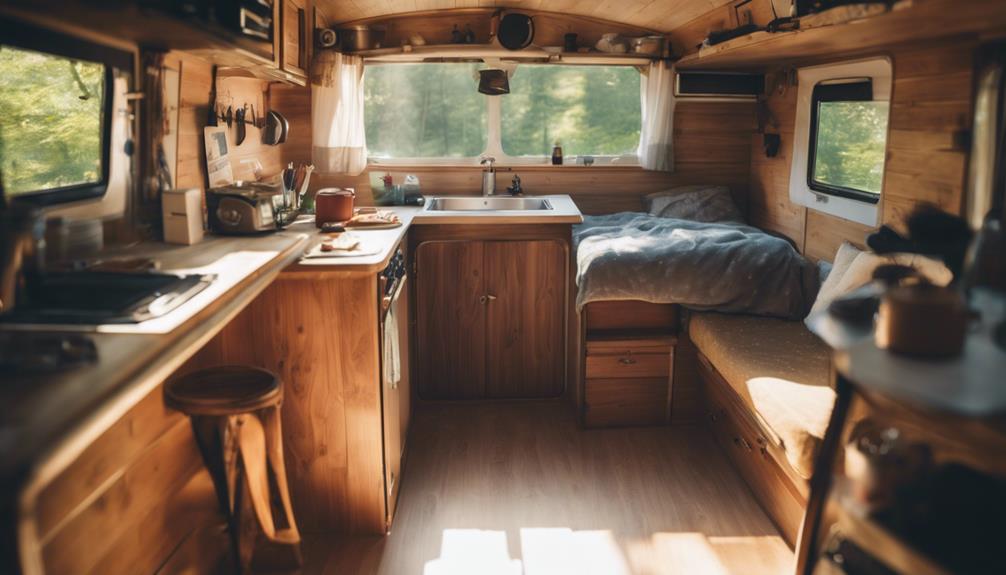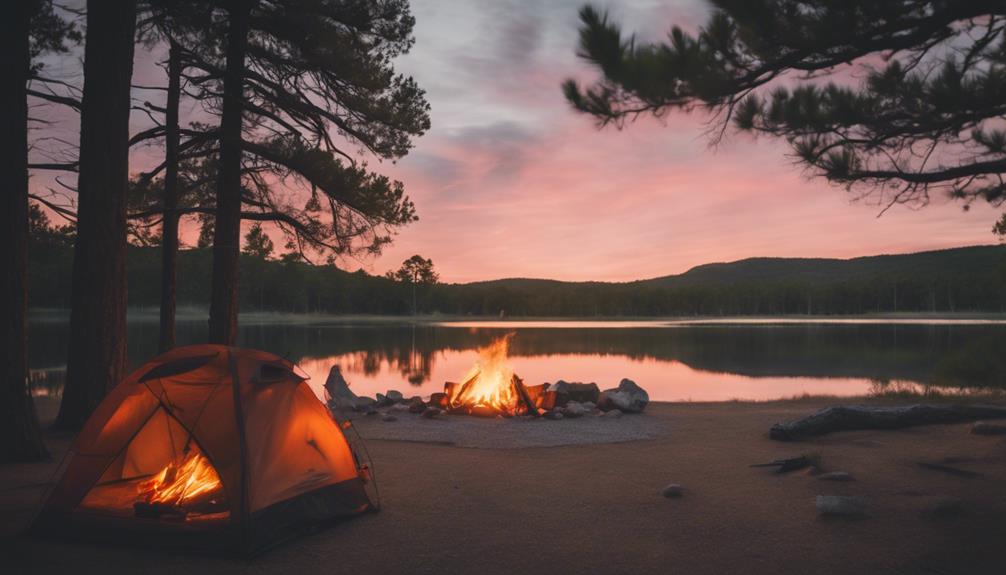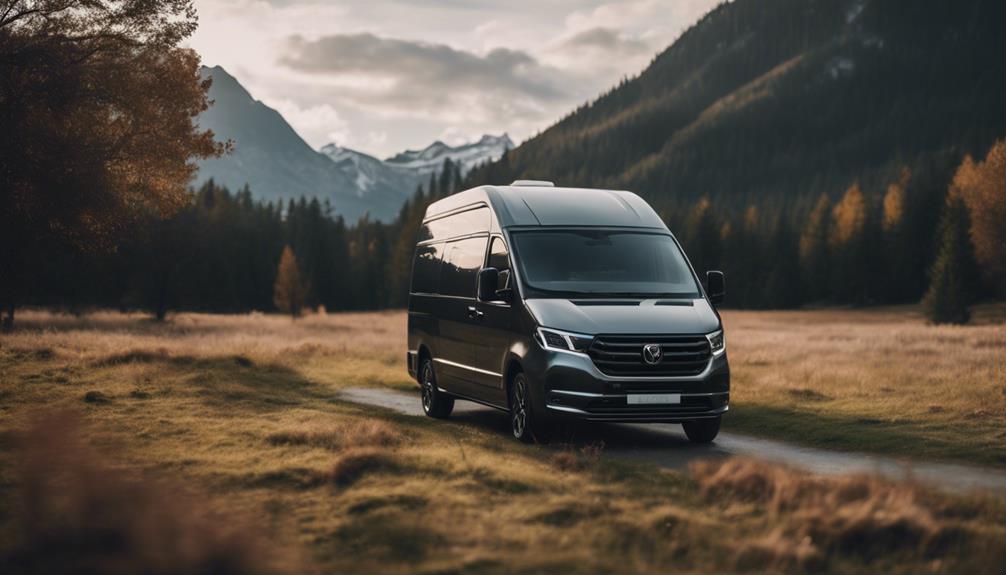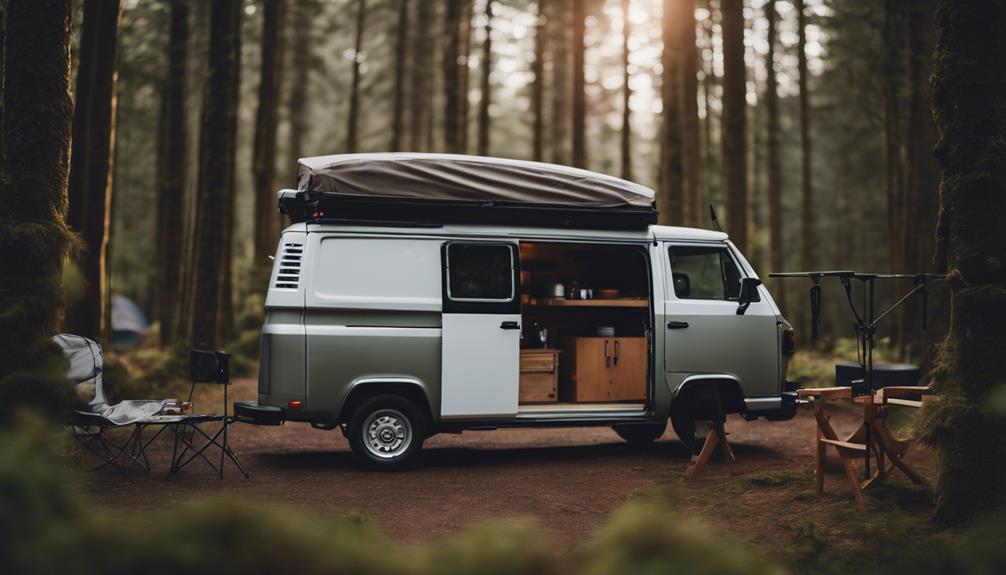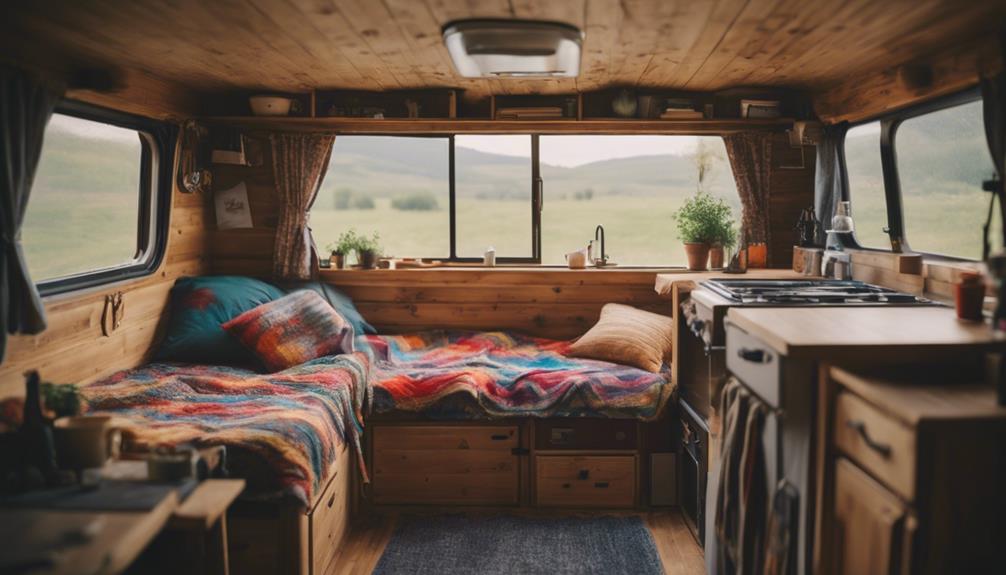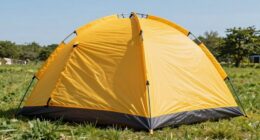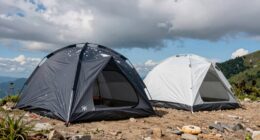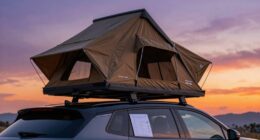Camper conversions can vary greatly in price, ranging from around $4,082 for a DIY project to over $200,000 for a high-end professional build. Basic small van conversions typically start at approximately $10,000, while luxury setups can exceed $100,000. Key factors influencing costs include the van size, materials used, and additional features you might want. If you opt for a DIY conversion, you could save up to 50% compared to hiring professionals. It's important to budget for unexpected expenses, typically an extra 10-15%. Keep exploring to uncover the best options for your camper conversion journey.
Introduction
When considering a camper conversion, it's essential to understand the varying costs involved, as they can range widely based on your choices and the level of customization you desire.
Camper conversion costs can start as low as $4,082 for a DIY conversion or soar to $200,000 for professional conversions. The van size and layout you choose will greatly affect your price estimates. Basic small van conversions begin around $8,998, while luxury builds can easily exceed $100,000 depending on the materials used and necessary installations included, like insulation, ventilation, and flooring.
It's important to account for conversion work that goes beyond the basics, as additional features can drive up costs. Unexpected expenses can also arise, so budgeting an extra 10-15% is wise to cover any unforeseen needs, such as extra insulation or soundproofing.
Understanding the full scope of what you want will help you make informed decisions, whether you opt for a DIY approach or hire professionals. With careful planning and a clear vision, you can navigate camper conversion costs effectively and create the perfect mobile living space.
Background Information
To understand camper conversion prices, you should first look at the origins of the vanlife movement and how it's evolved.
The rise of modular designs has made it easier for many to customize their living spaces on wheels.
Vanlife Movement Origins
How did the vanlife movement, rooted in the 1960s counterculture, evolve into a symbol of freedom and adventure for countless individuals?
It started as a quest for alternative lifestyles, where people sought to break free from societal norms. The iconic Volkswagen vans became synonymous with this movement, representing a nomadic lifestyle filled with exploration and spontaneity.
As the years went by, particularly in the 1970s and 1980s, the movement gained traction. Fast forward to the early 2000s, when social media took off. Suddenly, vanlifers could share their journeys and inspire a new generation enthusiastic to embrace this lifestyle. Rising housing costs and a growing interest in minimalism have fueled a resurgence in vanlife today.
The modern vanlife community isn't just about adventure; it emphasizes sustainability and eco-friendly living. Many enthusiasts are investing in solar panels and conscious materials for their camper conversions, aligning their travel with environmentally responsible choices.
This blend of freedom, adventure, and sustainability has transformed vanlife into more than just a trend; it's a lifestyle choice that resonates deeply with those seeking a simpler, more fulfilling way of life.
Emergence of Modular Designs
The emergence of modular designs in camper conversions revolutionizes the way you can customize your living space on the road. With these innovative setups, you can create customizable layouts that fit your personal needs and preferences perfectly. Modular designs often incorporate lightweight materials and pre-fabricated components, which can greatly reduce conversion time and costs compared to traditional builds.
One of the standout features of modular camper conversions is the use of removable furniture, allowing you to easily adjust your living space. Whether you need extra seating during the day or a comfortable sleeping area at night, these flexible configurations maximize space utilization without sacrificing comfort.
The market offers a range of kits, starting at around $5,000 for basic setups to more advanced configurations exceeding $20,000. Many of these modular options emphasize sustainability, utilizing eco-friendly materials and promoting energy-efficient systems.
This focus on sustainability appeals to environmentally conscious consumers, ensuring that your adventures leave a smaller footprint on the planet. With modular designs, you can enjoy a personalized, efficient, and eco-friendly camper conversion experience tailored just for you.
Recent Design Innovations
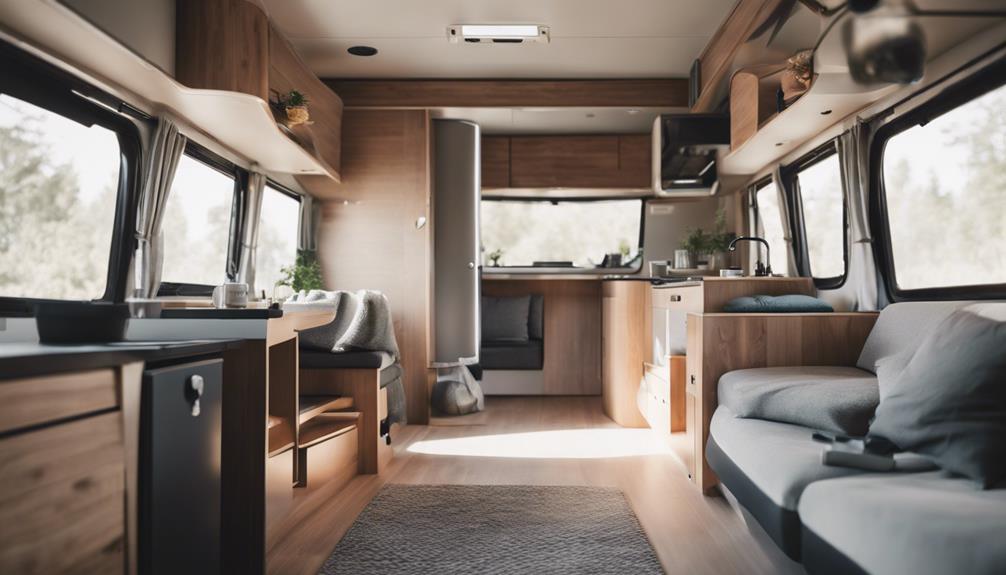
You'll be amazed at how smart technology is transforming camper conversions.
With integrated solar power systems and energy management solutions, you can easily enhance your off-grid adventures.
Plus, these innovations not only increase convenience but also boost your camper's overall efficiency.
Smart Technology Integration
Integrating smart technology into camper conversions not only enhances convenience but also boosts energy efficiency and safety.
With smart technology integration, you can upgrade your camper with advanced electrical systems that typically cost between $6,000 and $12,000. These systems efficiently manage power through solar panels and battery systems, ensuring you have energy when you need it.
Smart control systems allow you to manage everything from lighting to temperature right from your smartphone, making your camper feel like a home on the road.
High-quality ventilation systems, like MaxxAir fans, improve air circulation while keeping energy use low, priced between $160 and $350.
Safety is also a priority, with advanced security systems featuring motion detectors and remote monitoring. These enhancements can add $100 to $500 to your conversion cost.
If you're considering luxury camper conversions, you might also invest in smart kitchen appliances, such as smart refrigerators and induction cooktops, which can increase the conversion cost by $5,000 or more, depending on the brand and features.
With these innovations, your camper can truly become a modern, efficient, and secure living space.
Smart Technology Enhancements
How can recent design innovations in smart technology transform your camper into a high-tech haven? By incorporating smart technology enhancements, you can considerably elevate your camping experience.
Advanced electrical systems, costing between $6,000 to $12,000, allow for efficient energy management and remote monitoring, ensuring you stay connected even off the grid.
Adding solar panels not only promotes sustainability but can also add an extra $2,000 to $5,000 to your conversion, depending on the complexity of the system.
With smart thermostats and climate control systems, ranging from $150 to $1,000, you can enjoy precise temperature regulation that boosts comfort and energy efficiency.
Automated lighting systems, costing around $200 to $1,000, offer customizable ambiance while saving energy through motion sensors and remote controls.
Plus, the inclusion of smart appliances—like compact refrigerators and induction cooktops—elevates luxury, with costs ranging from $400 to $2,500 depending on the brand and features.
These innovations can turn your camper into a modern, efficient space, making your adventures more enjoyable and environmentally friendly.
Cost-Benefit Evaluation
When evaluating the cost-benefit of a camper van conversion, it's essential to weigh the advantages and disadvantages based on your travel habits.
You'll want to take into account industry insights and market trends to make an informed decision that suits your lifestyle.
Understanding these factors can help you determine if the investment aligns with your needs and budget.
Advantages and Disadvantages
While converting a van for camping offers flexibility in design and functionality, it's crucial to weigh the costs against your budget and desired features.
A DIY van conversion can be a budget-friendly option, allowing you to save on labor costs. However, it requires time, effort, and a certain skill level, which mightn't suit everyone.
On the other hand, professional conversion guarantees quality and safety but comes with a hefty price tag, often starting around $30,000 and soaring over $100,000 for customized luxury builds.
When planning your conversion, consider prioritizing essential features instead of luxury items. This approach helps maintain budget constraints while still achieving a functional living space.
Investing in high-quality materials can enhance durability and aesthetics, ultimately leading to long-term savings on repairs and replacements.
Industry Insights and Trends
Evaluating the cost-benefit of camper conversions reveals a growing trend toward personalized builds that fit various budgets and lifestyles.
You'll find camper conversion costs ranging from a rough estimate of $10,000 for basic modifications to over $100,000 for high-end, fully customized options. If you're savvy, a DIY camper van conversion can greatly reduce expenses, with costs starting around $4,082.
However, if you prefer a more hands-off approach, hiring a professional van conversion company typically begins at around $30,000, not including the price of the van.
When planning your budget, remember that the total cost includes essential installations like insulation, flooring, and kitchenette systems, which can vary based on material quality and van size.
Keep in mind that hidden costs are common; it's wise to set aside an additional 10-15% for unexpected expenses such as specialized tools or material upgrades.
Ultimately, a well-planned camper conversion can lead to long-term savings by providing comfort during travel while reducing expenses on hotels and meals.
Market Trends Overview
The market for camper conversions is booming, with costs ranging from around $4,082 for budget-friendly DIY projects to over $100,000 for luxurious custom builds, making it essential to weigh your options carefully.
When evaluating camper conversion costs, consider whether to start a DIY conversion or hire professionals. On average, DIY conversions can save you up to 50% compared to professional builds, provided you have the skills and time.
For budget conversions, expect to spend between $4,082 and $12,082, while mid-range options typically fall between $26,762 and $36,726. Your van conversion cost includes various factors like size, materials, and features. Investing in high-quality materials can enhance durability and functionality, but it may also increase overall costs.
Don't overlook the long-term savings associated with camper conversions. They can offset initial expenses by reducing hotel and dining costs during travel.
Essential Tools for Conversion
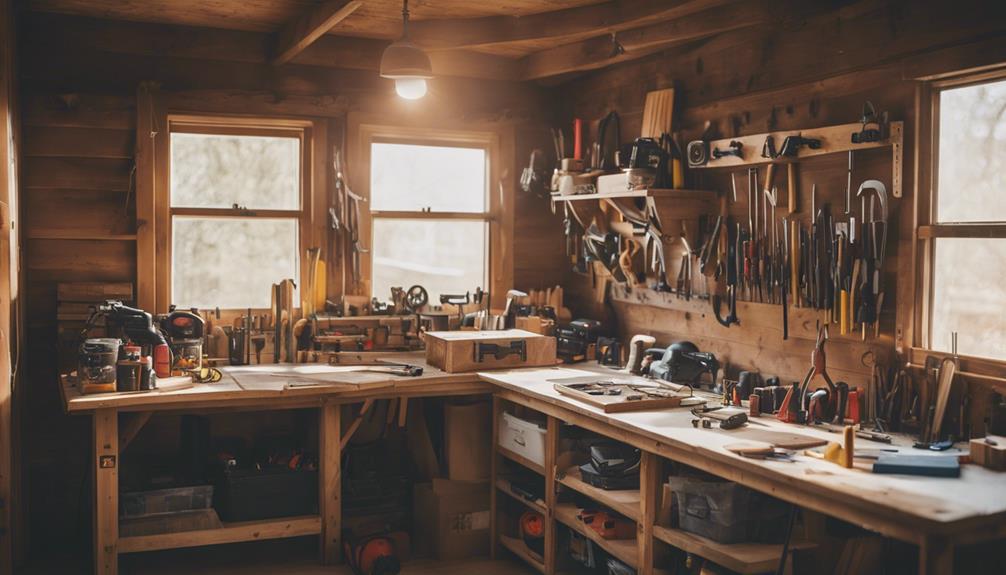
When you're ready to tackle your van conversion, having the right tools is vital for a smooth process.
Understanding how to effectively utilize space will help you create a functional layout while the right tools guarantee you can execute your plans efficiently.
Let's explore the essential tools that will make your conversion successful and maximize your space.
Conversion Process Overview
Vital tools are important for a successful van conversion, as they help you tackle framing, electrical work, and plumbing with ease.
When you're estimating van conversion costs, it's vital to take into account the tools needed for the conversion process. Common tools include saws, drills, wrenches, and screwdrivers, all of which facilitate various tasks. You'll also need a level and measuring tape to guarantee accurate measurements and alignment during installation.
Investing in quality vital tools can enhance your efficiency and precision, leading to a more professional-looking result in your camper van conversions.
While the initial investment may average around $363, you can minimize costs by borrowing or renting equipment from local hardware stores.
Effective Space Utilization Techniques
Maximizing space in your camper conversion means cleverly incorporating multi-functional furniture and utilizing vertical storage solutions. You can greatly enhance the available square footage by selecting furniture that serves multiple purposes, like a bed that converts into a seating area. This approach not only optimizes space in your van but also elevates your comfort.
To increase storage capacity, think about installing shelves and cabinets that reach up to the ceiling. This vertical space can be a game-changer, allowing you to keep essentials organized without sacrificing precious floor space. Modular designs offer you flexibility; removable or adjustable components can adapt to your changing needs, whether you're relaxing or cooking.
Additionally, consider collapsible elements like foldable tables and chairs that can be easily stowed away when not in use. This simple strategy frees up room for movement and other activities.
What is the typical cost of a camper conversion, and does that cost include the time it takes to complete the conversion?
The typical cost of a camper conversion can vary depending on factors like the size of the vehicle, materials used, and customization options. However, it typically ranges from $10,000 to $30,000. This cost may or may not include the camper conversion time estimates, which can range from a few weeks to several months.
What Factors Determine the Cost of Camper Conversions?
When considering camper conversion cost breakdown, several factors come into play. The type and size of the vehicle, the quality of materials used, the complexity of the design, and any additional features all contribute to the overall cost. Additionally, labor and installation costs can also heavily impact the final price.
Conclusion
Ultimately, understanding the costs involved in camper conversions helps you make informed decisions that fit your budget and lifestyle.
Whether you opt for a DIY approach or hire a professional, knowing the price estimates will guide you through the conversion process. A basic van conversion can start around $8,998, but custom projects can soar beyond $100,000, depending on features and amenities.
If you're looking to save money, consider a DIY conversion, which can range from $4,082 to $12,082. Professional conversions, on the other hand, typically range from $30,000 to $200,000.
Don't forget to factor in essential systems like electrical setups and water systems, which can add $1,200 to $5,000 and $80 to $634, respectively.
Always anticipate hidden costs; budgeting an extra 10-15% can cushion unexpected expenses. Your material choices also greatly affect your final cost; opting for high-quality materials may enhance durability and aesthetics but can increase your overall budget.
Frequently Asked Questions
How Much Does a Camper Conversion Cost?
A camper conversion can vary greatly in cost. You'll find basic options starting around $8,998, while custom builds can exceed $100,000. Consider your needs and budget to find the right fit for you.
Do Converted Campervans Hold Their Value?
Yes, converted campervans can hold their value well. If you build one with quality materials and popular features, like solar panels, you're likely to retain a significant portion of its value over time.
How Much Does a Ford Transit Camper Conversion Cost?
A Ford Transit camper conversion can cost anywhere from about $8,998 for basic modifications to over $100,000 for high-end setups. Your expenses will depend on the features and customization you choose.
How Much Does a Van Conversion Cost?
When considering a van conversion cost, expect to spend anywhere from $4,000 for DIY projects to $200,000 for fully customized builds. Don't forget to factor in hidden costs for unexpected expenses along the way.
Conclusion
In summary, converting a camper can be an exciting and rewarding project, but it's crucial to take into account your budget and needs.
By understanding the costs involved and the recent design innovations, you can make informed decisions that suit your lifestyle.
Remember to gather the necessary tools and plan carefully to guarantee a successful conversion.
Whether you're going for a simple setup or a more elaborate design, you'll be on your way to creating the perfect mobile retreat.

